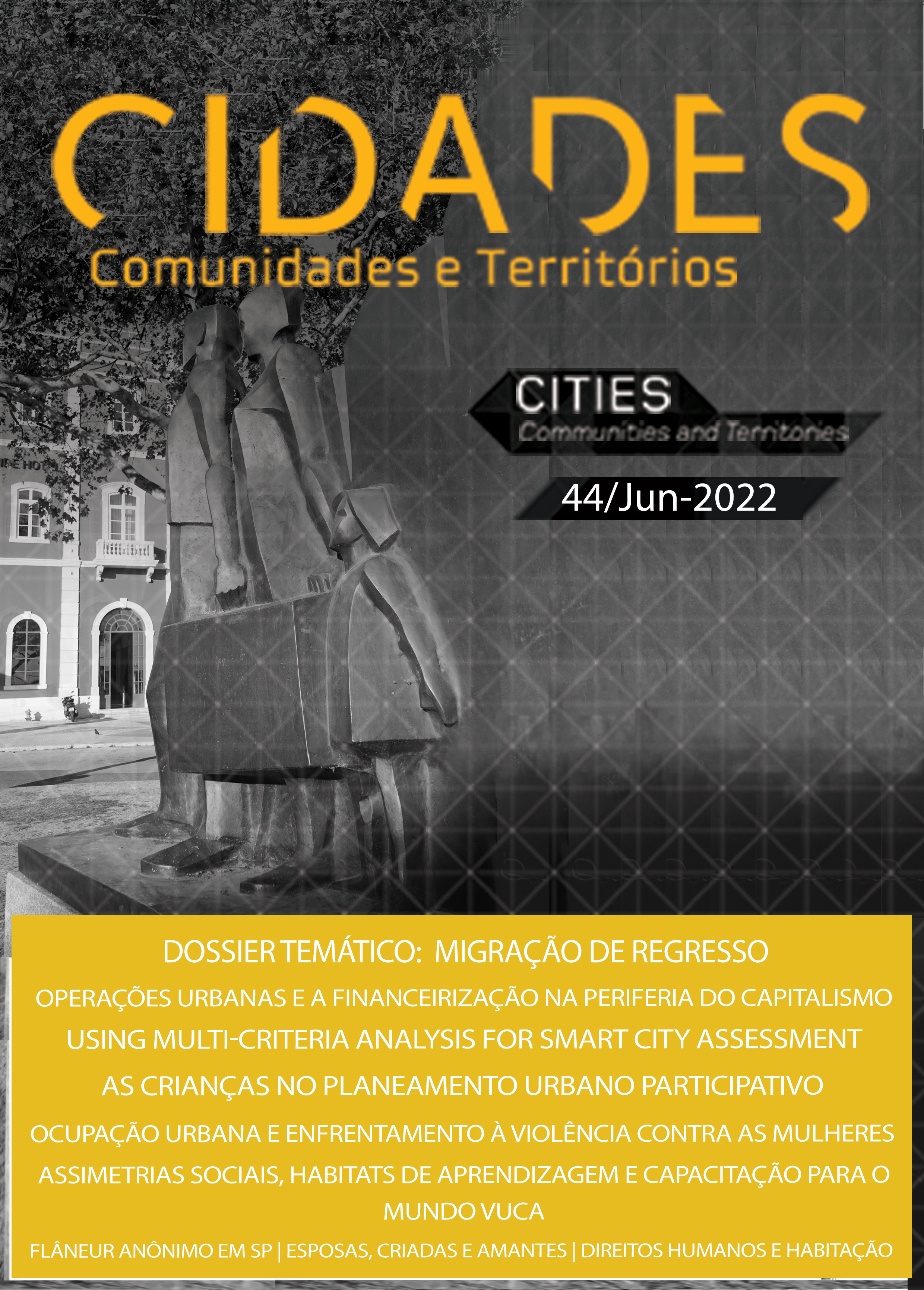Emigration policies, perceptions, and practices of the returns management during the Portuguese Dictatorship (1945-1974)
Keywords:
Portuguese returns, Transatlantic and European movement, dictatorial politicsAbstract
This article aims to analyse how the return of emigrants (or their intention to return) was conceived by Estado Novo. Studies on return have focused on the period after 25th April 1974 and, although after the Second World War there were movements of return, it is considered that there was no clear return policy.
The purpose of this article is to show that, despite the lack of this policy, the question of the return was present in the thinking and institutional actions of the Portuguese dictatorship. Using historical sources, it is intended to demonstrate, on the one hand, that the rationality applied in the management of legal exits from 1945 onwards reveals a concern with managing the flow of desired and undesired returns. On the other hand, emigration to European countries made it possible to reconsider the role of returnees, within the framework of changes in the institutional mentality about their usefulness in the society of origin, a vision that, even today, marks that of the Portuguese State on the return of emigrants.
References
Alves, J. F. (1994). Os Brasileiros. Emigração e retorno no Porto Oitocentista. Porto: s.n.
Antunes, M. da G. M. R. (1966). Benefícios e custos da emigração: introdução ao seu estudo. Lisboa: Fundo de Desenvolvimento da Mão-de-Obra.
Baganha, M. I. (1988). International labor movements: Portuguese emigration to the United States 1820-1930 [Tese de doutoramento, Universidade de Pennsylvania].
Bandeira, M. L. (1996). Demografia e modernidade. Família e transição demográfica em Portugal. Lisboa: Imprensa Nacional Casa da Moeda.
Borges, M. J. (2018). Correntes de ouro. Emigração Portuguesa Para a Argentina em Perspectiva Regional e Transatlântica. Lisboa: Imprensa do ICS.
Castelo, Cláudia (2007). Passagens para África: o povoamento de Angola e Moçambique com naturais da Metrópole (1920-1974). Lisboa: Ed. Afrontamento.
Delaunay, M. (2019). La fin de l’empire colonial portugais : le processus d’intégration des retornados au Portugal (1975-2018). In O. Dard, & A. Dulphy, (Eds.), Déracinés, exilés, rapatriés? Fins d’empires coloniaux et migrations (p. 75-94). Bruxelles : Peter Lang.
Douki, C. (2013). Compter les retours d’émigrants dans l’Italie du début du XXe siècle: conventions statistiques, libéralisme économique et politique publique. Revue Européenne des Migrations Internationales, 29(3), 11–32.
Enciso, F. S. A. (2017). They should stay there, The story of Mexican Migration and Repatriation during the Great Depression. Chapel Hill: The University of North Carolina Press.
Lains, Pedro (2003). Os Progressos do Atraso. Uma Nova História Económica de Portugal. 1842-1992. Lisboa: Imprensa do ICS.
Lázaro, A. G. (2015). Inmigración y retorno. Espanõles en la Ciudad de México, 1900-1936. Madrid: Marcal Pons.
Leeds, E. R. (1984). Labor export, development, and the State: The political economy of Portuguese emigration [Tese de doutoramento, Boston University].
Murteira, M. (1965). Emigração e política de emprego em Portugal. Análise Social, 3(11), 258–278.
Murteira, M. (1966). A criação do Serviço Nacional de Emprego. Análise Social, 4(13), 112–116.
Oliveira, I. T. (2007). Emigração, retorno e reemigração na primeira metade do século XX. Análise Social, 42(184), 837–852.
Oliveira, I. T. de, Candeias P., Peixoto, J. Azevedo, J., & Malheiros, J. M. (2016). Regresso e circulação de emigrantes portugueses no início do século XXI. Sociologia. Problemas e práticas, 81, 11–35.
Pereira, V. (2010). «Ainda não sabe qual é o pensamento de Sua Excelência Presidente do Conselho». O Estado português perante a emigração para França (1957-1968). In N. Domingos, & V. Pereira (Eds.), O Estado Novo em questão (pp. 42–79). Lisboa: Edições 70.
Pereira, V. (2012). La dictature de Salazar face à l’émigration. L’État portugais et ses migrants en France (1957-1974). Paris : SciencesPo. Les Presses.
Pereira, V. (2014). Quel 25 avril pour les émigrés? L’État portugais et les migrants en France pendant la Révolution de Œillets ? Migrance, 43, 43–56.
Pinho, F., Marques, J. C., Góis, P.(2022). Portugal e Espanha, países para regressar: análise comparativa de políticas de recuperação de emigrantes, CIDADES, Comunidades e Territórios, 44.
Pires, R. P. (1984). Os Retornados: um estudo sociográfico. Lisboa: Instituto de Estudos para o Desenvolvimento.
Poinard, M. (1983). Emigrantes portugueses: o regresso. Análise Social,19(75), 29–56.
Santos, A. P. dos (2018). A Fundação do Instituto Nacional de Imigração e Colonização no segundo governo de Getúlio Vargas (1951-1954). Revista Eletrónica Discente História.com, Cachoeira, 5(9), 3–17.
Santos, I. (2014). A Junta da Emigração e a política de emigração durante o Estado Novo [Tese de doutoramento, Universidade Nova de Lisboa].
Santos, Y. (2021). The Portuguese State and its emigrants: policy and practices in the repatriation of the minors. In B. Scutaru, & S. Paoli (Eds.), Child Migration and biopolitics. Old and New Experiences in Europe (pp. 183–201). Abingdon: Routledge.
Silva, M. (1984). Retorno, Emigração e Desenvolvimento Regional em Portugal. Lisboa: Instituto de Estudos para o Desenvolvimento.
Triadafilopoulo, T., & Schönwalder, K. (2006). How the Federal Republic Became an Immigration Country. Norms, Politics and the Failure of West Germany's Guest Worker System. German Politics and Society, 80(24), nº3, 1–19.
Damilakou, M., & Venturas, L. (2015). Discourses on Latina America: The Migration-Development Nexus. In L. Venturas (Ed.), International « Migration Management » in the early cold war. The Intergovernmental Committee for European Migration (pp. 293–312). Corinth: University of the Peloponnese.
Spire, A. (2005). Étrangers à la carte. L’administration de l’immigration en France (1945-1975). Paris : Grasset.
Viet, V. (1998). La France immigrée. Construction d’une politique 1914-1997. Paris: Fayard.
Downloads
Published
Issue
Section
License
Copyright (c) 2022 Yvette Santos

This work is licensed under a Creative Commons Attribution-NonCommercial-NoDerivatives 4.0 International License.
CIDADES, Comunidades e Territórios by DINÂMIA'CET-Iscte is licensed under a CC-BY licence.






